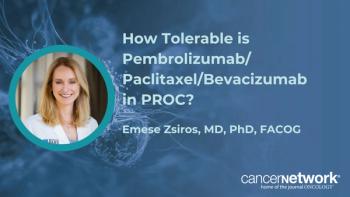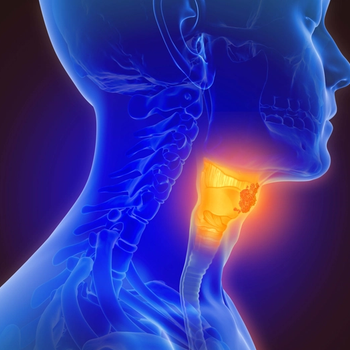
FDA Grants Fast Track Designation to Enobosarm in AR+, ER+, HER2- Metastatic Breast Cancer
Enobosarm was granted fast track designation by the FDA for the treatment of patients with androgen receptor–positive, estrogen receptor–positive, HER2-negative metastatic breast cancer.
The FDA has granted a fast track designation to enobosarm (Ostarine) for the treatment of patients with androgen receptor (AR)–positive, estrogen receptor (ER)–positive, HER2-negative metastatic breast cancer, according to a press release from developer Veru Inc.1
The therapy was evaluated as part of the phase 3 ARTEST trial (NCT04869943), which evaluated the safety and efficacy of oral enobosarm at a dose of 9 mg daily in roughly 210 patients. Patients were in their third line of treatment for metastatic disease, and had progressed following treatment with a nonsteroidal aromatase inhibitor, fulvestrant, and a CDK4/6 inhibitor.
“While endocrine therapies have been the mainstay of breast cancer treatment for decades, these therapies have all focused on the [ER]. Targeting the AR, a demonstrated tumor suppressor, provides us with an opportunity to bring a truly novel hormone treatment approach to patients who have AR-positive, ER-positive, HER2-negative metastatic breast cancer,” Mitchell Steiner, MD, chairman, president and chief executive officer at Veru Inc, said in a press release.
Patients were eligible for this treatment if they had disease that progressed after treatment with a nonsteroidal aromatase inhibitor, fulvestrant, and CDK4/6 inhibitor with an androgen receptor nucleus staining of 40% or higher. As the therapy is being developed for patients with a positive AR staining with a threshold of 40% or higher nuclei staining, a companion diagnostic test is currently being developed and validated in order to better identify patients who are likely to respond to treatment.2
The selective androgen receptor targeting agonist was recently assessed as part of the open label phase 2 G200802 clinical trial (NCT02463032) in patients with metastatic AR-positive, ER-positive breast cancer.3 Patients were randomized to receive either 9 mg (n = 72) or 18 mg (n = 64) of oral enobosarm daily. The primary end point of the study was clinical benefit rate at 6 months per the RECIST 1.1, with key secondary end points including objective response rate, best overall response, radiographic progression-free survival (rPFS), and duration of clinical benefit.
Patient had a median age of 60.8 years in the 9 mg group and 62.1 years in the 18 mg group. Additionally, 94.0% of patients in the 9mg cohort had centrally-confirmed AR positivity vs 86.5% was confirmed in the 18 mg cohort.
A clinically meaningful clinical benefit rate of 32% was observed in the 9 mg group compared with 29% in the 18 mg group. When the study was terminated, the median duration of clinical benefit was not reached in the 9 mg group and was 14.1 months in the 18 mg group.
A post-hoc analysis showed that the presence of AR and the amount of expression could predict which patients were most likely to have an antitumor response to enobosarm. The analysis combined patients from the 9 mg and 18 mg groups with a known AR status and measurable disease (n = 84). Investigators used a 40% AR expression cutoff rate, which appeared to best enrich for patient who were most likely to benefit from treatment enobosarm.
At 24 weeks, the clinical benefit rate was 52% at 40% AR staining compared with 14% for less than 40% staining (P<.0004). Patients had a combined partial and complete response of 34% at 40% AR staining compared with 2.7% for less than 40% staining (P <.0003). The median rPFS was 5.47 months at 40% AR staining compared with 2.7 months for 40% or less staining (P <.001).
When using the 40% cutoff, 57% of women with AR-positive, ER-positive, and HER2-negative metastatic breast cancer would qualify for treatment with enobosarm. Women treated with 9 mg or 18 mg of enobosarm reported to have an improvement in quality of life, including mobility, anxiety or depression, and pain discomfort. A total of 6 patients experienced drug-related serious adverse effects of grade 3/4 in the 9 mg group, as well as 10 patients in the 18 mg group.
Enobosarm is also currently being examined in the phase 3 ENABLAR-2 trial which is evaluating enobosarm plus abemaciclib (Verzenios) as a second-line treatment for patients with AR-positive, ER-positive, HER2-negative breast cancer. The population of patients have progressed after treatment with palbociclib (Ibrance) and either a nonsteroidal aromatase inhibitor or fulvestrant combination with an AR nuclei staining of 40% or more. Additionally, enobosarm is also being assessed in a phase 2 study in combination with sabizabulin (VERU-111) in a population of patients with metastatic triple-negative breast cancer following treatment with 2 prior systemic chemotherapies.
References
1. Veru announces FDA grant of fast track designation for enobosarm for the treatment of AR+ ER+ HER2- metastatic breast cancer. News Release. Veru Inc. January 10, 2022. Accessed January 10, 2022. https://yhoo.it/33lti6p
2. Veru enrolls first patients in international phase 3 clinical trial of enobosarm in metastatic breast cancer. News Release. Veru Inc. October 13, 2021. Accessed January 10, 2022.
3. Palmieri C, Linden HM, Birrell S, et al. Efficacy of enobosarm, a selective androgen receptor (AR) targeting agent, correlates with the degree of AR positivity in advanced AR+/estrogen receptor (ER)+ breast cancer in an international phase 2 clinical study. J Clin Oncol. 2021;39(suppl 15):1020-1020. doi:10.1200/JCO.2021.39.15_suppl.1020
Newsletter
Stay up to date on recent advances in the multidisciplinary approach to cancer.










































